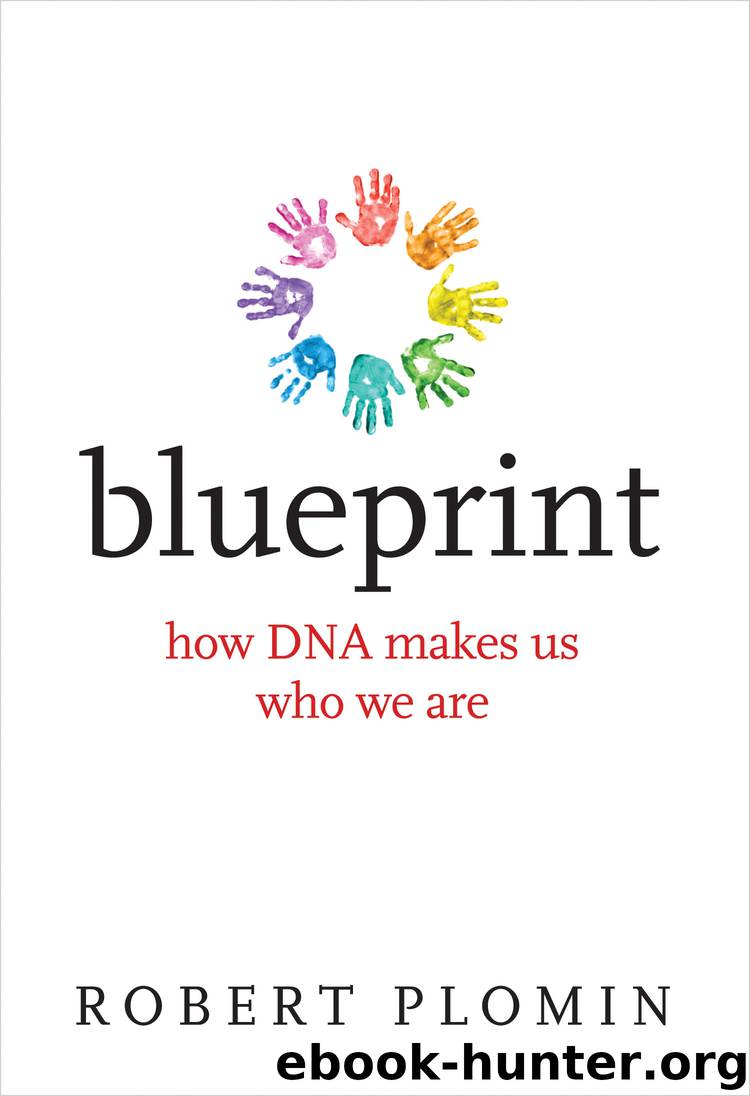Blueprint by Robert Plomin

Author:Robert Plomin
Language: eng
Format: epub
Publisher: MIT Press
Published: 2018-10-26T00:00:00+00:00
12
The DNA fortune teller
It has been known for decades that the heritability of psychological disorders and dimensions is caused by many DNA differences, not just one or two genes that pack a big punch. The shock from genome-wide association studies was the realization what ‘many’ meant – not a few dozen DNA differences but tens of thousands. GWA studies have shown that there are no associations that account for more than 1 per cent of the differences between individuals and that the average effect size is less than 0.01 per cent. This means that thousands of DNA differences contribute to the heritability of psychological traits and that huge GWA sample sizes are needed to detect these tiny associations.
After the false start of candidate-gene studies that failed to replicate, GWA research set a stringent criterion for reporting statistically significant ‘hits’ by correcting associations for a million tests across the genome. This criterion missed the many associations that do not, and cannot, reach statistical significance because their effects are so small. No matter how tiny these effects are, they can be combined to create a composite score, or polygenic score. Although the minuscule effects of individual SNPs are useless for prediction, polygenic scores that aggregate these effects, no matter how small, can powerfully predict genetic propensities. The ‘poly’ of ‘polygenic’ is what makes these scores able to predict individual differences in psychology. In other words, the key criterion for a GWA study is not how many associations reach statistical significance. Much more important is the power of a polygenic score derived from the results of a GWA study to predict individual differences.
Polygenic scores, based on DNA rather than crystal balls, are fortune tellers. As we shall see, prediction is crucial because it is the key to the prevention of psychological problems and the promotion of promise. This is the new world of personal genomics, which begins with the ability to use inherited DNA differences across the genome to predict psychological differences. For psychological dimensions and disorders, some polygenic scores have already reached impressive levels of predictive power. This chapter shows what a polygenic score is and describes the power of polygenic scores created in the past two years. It reveals some of my own polygenic scores to glimpse the future of psychological personal genomics.
Because polygenic scores are the basis for the DNA revolution in psychology, it is essential to understand what they are. A polygenic score is like any composite score that psychologists routinely use to create scales from items, such as those on a personality questionnaire. The goal of a polygenic score is to provide a single genetic index to predict a trait, whether schizophrenia, well-being or intelligence. To get a concrete understanding of a polygenic score, consider a personality trait like shyness. A questionnaire to assess shyness includes multiple items in order to tap into different facets of shyness. For example, a typical shyness questionnaire will have items about how anxious you are in social situations and how much you
Download
This site does not store any files on its server. We only index and link to content provided by other sites. Please contact the content providers to delete copyright contents if any and email us, we'll remove relevant links or contents immediately.
| Cell Biology | Developmental Biology |
| Entomology | Marine Biology |
| Microbiology | Molecular Biology |
| Biostatistics |
Sapiens: A Brief History of Humankind by Yuval Noah Harari(14389)
The Tidewater Tales by John Barth(12659)
Mastermind: How to Think Like Sherlock Holmes by Maria Konnikova(7345)
The Thirst by Nesbo Jo(6944)
Do No Harm Stories of Life, Death and Brain Surgery by Henry Marsh(6941)
Why We Sleep: Unlocking the Power of Sleep and Dreams by Matthew Walker(6725)
Life 3.0: Being Human in the Age of Artificial Intelligence by Tegmark Max(5558)
Sapiens by Yuval Noah Harari(5370)
The Body: A Guide for Occupants by Bill Bryson(5096)
The Longevity Diet by Valter Longo(5064)
The Rules Do Not Apply by Ariel Levy(4969)
The Immortal Life of Henrietta Lacks by Rebecca Skloot(4587)
Animal Frequency by Melissa Alvarez(4471)
Why We Sleep by Matthew Walker(4445)
The Hacking of the American Mind by Robert H. Lustig(4382)
Yoga Anatomy by Kaminoff Leslie(4363)
All Creatures Great and Small by James Herriot(4321)
Double Down (Diary of a Wimpy Kid Book 11) by Jeff Kinney(4271)
Embedded Programming with Modern C++ Cookbook by Igor Viarheichyk(4179)
